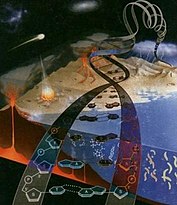Evolutionary Biology
Life on Earth is astonishingly complex. There are tens of millions of living species, or kinds of organisms. Some endangered species have just a few individual organisms, while others have quadrillions. Every individual organism is, all by itself, an extremely complicated object, with many interacting parts. Further, organisms interact with other organisms, of the same species and of other species, to form an inconceivably complex network of causes and effects.

Evolutionary biology studies the origin and methods of this complexity. Evolutionary biologists try to answer questions like: Why are there so many species, and how did they come to be? What are the relationships between species and how did these relationships arise? How did organisms develop their intricate structures and ways of life? Why do species become extinct? How did life originate in the first place?
In the last two hundred years, great advances have been made in answering many of these questions. An overarching theory, the theory of evolution by modification and natural selection, first expounded by Charles Darwin in the 1850's, has been very successful at explaining the origin of life's complexity in general, although many puzzling questions remain unanswered.
This book will present our current understanding of how life on Earth got the way it is, and describe current research directions in this profound and fascinating field.